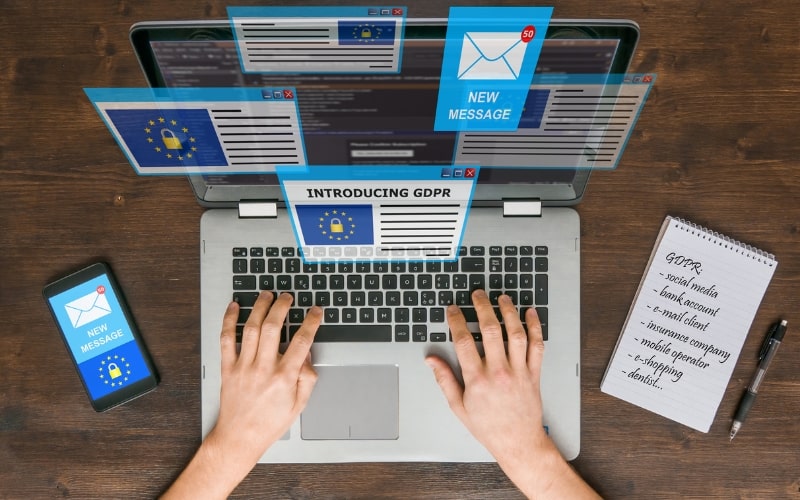The General Data Protection Regulation (GDPR) has fundamentally transformed how businesses collect, process, and protect personal data. Implemented on May 25, 2018, GDPR aims to safeguard the privacy rights of individuals within the European Union (EU). For businesses involved in email marketing, understanding and complying with GDPR is essential to avoid hefty fines and build trust with their audience. In this comprehensive guide, we will delve into the key aspects of GDPR compliance, how it impacts email marketing, and best practices to ensure your campaigns are both effective and lawful.
Understanding GDPR
GDPR is a regulation that requires businesses to protect the personal data and privacy of EU citizens. It applies to all companies that process personal data of individuals residing in the EU, regardless of the company’s location. This regulation encompasses various aspects of data protection, including data collection, storage, processing, and sharing.
Key Principles of GDPR
- Lawfulness, Fairness, and Transparency: Personal data must be processed lawfully, fairly, and transparently. Individuals must be informed about how their data is being used.
- Purpose Limitation: Data should be collected for specified, explicit, and legitimate purposes and not further processed in a manner incompatible with those purposes.
- Data Minimization: Only the data necessary for the intended purpose should be collected.
- Accuracy: Personal data must be accurate and kept up to date. Inaccurate data should be corrected or deleted promptly.
- Storage Limitation: Data should be kept in a form that permits identification of individuals for no longer than necessary.
- Integrity and Confidentiality: Personal data must be processed in a manner that ensures appropriate security, including protection against unauthorized or unlawful processing and accidental loss, destruction, or damage.
- Accountability: Data controllers are responsible for, and must be able to demonstrate, compliance with GDPR principles.
Impact of GDPR on Email Marketing

Email marketing is a powerful tool for businesses to reach their audience, but GDPR has introduced strict requirements that marketers must adhere to. Non-compliance can result in significant fines, damage to reputation, and loss of customer trust. Here are the main areas where GDPR impacts email marketing:
Consent
Under GDPR, obtaining explicit consent from individuals before sending marketing emails is mandatory. Consent must be freely given, specific, informed, and unambiguous. This means:
- Opt-In Forms: Your opt-in forms must clearly state what individuals are signing up for. Pre-ticked boxes or implied consent are not acceptable.
- Granular Consent: If you plan to use the data for multiple purposes (e.g., email marketing and data analysis), you must obtain separate consent for each purpose.
- Easy Withdrawal: Individuals must have the ability to withdraw their consent easily. This can be achieved by including an unsubscribe link in your emails.
Data Subject Rights
GDPR grants individuals several rights regarding their personal data, which email marketers must respect:
- Right to Access: Individuals can request access to their data and obtain information on how it is being used.
- Right to Rectification: Individuals can request corrections to their inaccurate or incomplete data.
- Right to Erasure: Also known as the ‘right to be forgotten,’ individuals can request the deletion of their data.
- Right to Restriction of Processing: Individuals can request the restriction of their data processing under certain conditions.
- Right to Data Portability: Individuals can request their data in a structured, commonly used, and machine-readable format to transfer it to another controller.
- Right to Object: Individuals can object to the processing of their data for direct marketing purposes.
Data Security
Ensuring the security of personal data is a critical aspect of GDPR compliance. Email marketers must implement appropriate technical and organizational measures to protect data from unauthorized access, alteration, or destruction. This includes:
- Encryption: Encrypting data in transit and at rest to protect it from breaches.
- Access Controls: Limiting access to personal data to authorized personnel only.
- Regular Audits: Conducting regular audits and risk assessments to identify and mitigate vulnerabilities.
Data Breach Notification
In the event of a data breach, GDPR requires data controllers to notify the relevant supervisory authority within 72 hours of becoming aware of the breach. If the breach poses a high risk to the rights and freedoms of individuals, those affected must also be informed without undue delay. Having a robust data breach response plan in place is crucial for timely and effective action.
Best Practices for GDPR Compliance in Email Marketing

Achieving GDPR compliance in email marketing involves more than just ticking boxes. It requires a commitment to data protection and privacy at every level of your organization. Here are some best practices to help you navigate GDPR compliance:
Conduct a Data Audit
Start by conducting a comprehensive audit of the personal data you collect, process, and store. Identify the sources of data, the purposes for which it is used, and the legal basis for processing. This audit will help you understand your data flows and identify areas that require attention.
Update Your Privacy Policy
Your privacy policy should clearly explain how you collect, use, and protect personal data. It must be easily accessible, written in clear and concise language, and include information on individuals’ rights and how they can exercise them. Regularly review and update your privacy policy to ensure it reflects any changes in your data processing activities.
Implement Double Opt-In
Implementing a double opt-in process is a highly recommended practice for obtaining explicit consent. With double opt-in, individuals must confirm their subscription by clicking a link sent to their email address. This additional step ensures that the person subscribing is the owner of the email address and consents to receive marketing emails.
Maintain Consent Records
Keep detailed records of the consent you obtain, including who gave consent, when it was given, how it was obtained, and what information was provided at the time. These records will serve as evidence of compliance in case of an audit or investigation.
Segment Your Email List
Segmentation is an effective way to ensure that your email marketing campaigns are relevant and targeted. By segmenting your email list based on criteria such as demographics, behavior, and preferences, you can deliver personalized content that resonates with your audience. This approach not only improves engagement but also demonstrates your commitment to respecting individuals’ preferences.
Regularly Clean Your Email List
Maintaining a clean email list is essential for GDPR compliance and email deliverability. Remove inactive subscribers, invalid email addresses, and those who have withdrawn their consent. Regularly cleaning your email list helps improve your sender reputation and ensures that you are only targeting individuals who have explicitly opted in.
Provide an Easy Unsubscribe Option
Make it easy for individuals to unsubscribe from your emails. Include a visible and functional unsubscribe link in every email you send. Respect unsubscribe requests promptly and remove the individuals’ data from your mailing list.
Train Your Team
GDPR compliance is a team effort. Ensure that all employees involved in email marketing understand the regulation and their responsibilities. Provide regular training on data protection principles, consent management, and data security best practices.
Monitor and Improve
GDPR compliance is an ongoing process. Regularly monitor your data processing activities, review your consent mechanisms, and stay updated on regulatory changes. Continuously seek ways to improve your data protection practices and demonstrate your commitment to privacy.
Benefits of GDPR Compliance

While GDPR compliance may seem daunting, it offers several benefits for businesses:
Enhanced Trust and Reputation
Complying with GDPR demonstrates your commitment to protecting individuals’ privacy. This commitment can enhance trust and reputation among your audience, leading to stronger customer relationships and loyalty.
Improved Data Quality
By implementing GDPR principles, you ensure that the data you collect is accurate, relevant, and up to date. High-quality data leads to more effective email marketing campaigns and better decision-making.
Reduced Risk of Fines
Non-compliance with GDPR can result in significant fines of up to €20 million or 4% of your global annual turnover, whichever is higher. By adhering to the regulation, you mitigate the risk of financial penalties.
Competitive Advantage
In a privacy-conscious market, businesses that prioritize data protection and privacy gain a competitive edge. GDPR compliance can be a differentiator that sets you apart from competitors.
Conclusion
GDPR compliance is not just a legal obligation; it is an opportunity to build trust, enhance data quality, and improve your email marketing efforts. By understanding the key principles of GDPR, respecting individuals’ rights, and implementing best practices, you can ensure that your email marketing campaigns are effective and lawful. Embrace GDPR compliance as a foundation for responsible data management, and you will reap the benefits of improved customer relationships and a stronger brand reputation.
Thus, improving traffic and sales for your website. Read more on the other reasons why your website isn’t getting traffic and discover actionable tips to drive more visitors to your site. Embracing GDPR compliance can be a game-changer, not just for avoiding penalties but also for building a loyal and engaged audience that trusts your brand. By following these guidelines and staying committed to data protection, you can navigate the complexities of GDPR and thrive in the digital marketing landscape. Remember, GDPR compliance is an ongoing journey, and staying informed about regulatory updates and best practices will help you maintain a robust and compliant email marketing strategy.


